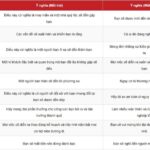Sleep is essential for restoring energy after a long day of work and study. However, not many people are aware that sleeping positions and directions can also impact our health. According to research and folk wisdom, certain sleeping directions can have adverse effects on our well-being, especially when we turn our heads in specific ways. Here are two sleeping directions to avoid for optimal health.

Below are two sleeping directions to avoid for optimal health.
1. Facing the bedroom door
A common habit that many are unaware of is sleeping with your head facing the bedroom door. However, according to feng shui and sleep experts, this direction is highly inadvisable. Sleeping with your head towards the door can disrupt your sleep and mental well-being.
Reason: When you sleep with your head facing the door, you may experience feelings of anxiety and restlessness. The door is where air circulates and can carry elements such as sound, light, and even disturbances from outside, affecting your sleep quality. Additionally, the constant movement in and out of the room can make you feel insecure and hinder deep sleep. From a feng shui perspective, the door is where energy enters, and sleeping with your head facing it can disrupt the flow of positive energy into your body, leading to health issues, stress, or fatigue.
Solution: Position yourself with your head turned inward, away from the door. This creates a sense of security and stability, promoting better sleep.
2. Facing the wall
Sleeping with your head towards a wall is another practice to avoid. While a wall may provide a sense of solidity and safety, improper placement can severely impact your health and sleep quality.
Reason: The wall can obstruct airflow, creating a stuffy and uncomfortable environment. Turning your head towards the wall restricts your personal space, leading to a cramped and claustrophobic feeling, potentially causing oxygen deprivation and sleep difficulties. Moreover, energy flow is hindered when you sleep facing a wall, resulting in energy imbalances that may cause fatigue or headaches upon waking. If the wall near your bed is cluttered or has distracting elements, it can also make you feel uneasy and prone to sleep disturbances.
Solution: Instead of facing the wall, opt for a more open sleeping direction, such as towards a window or into a spacious room. This improves airflow and creates a more comfortable sleeping environment, promoting deeper, healthier sleep.
Considerations for choosing a sleeping direction
Bed direction: Position your bed in a well-ventilated area, avoiding direct alignment with doors or windows to prevent sleep interruptions. Ensure natural light or lamp light doesn’t shine directly on your bed, disrupting your rest.
Bed placement: According to feng shui, avoid placing your bed near the entrance or under a beam, as it may induce stress or headaches. Ideally, position your bed facing into the room, avoiding direct alignment with windows or mirrors.
Sleeping positions and directions influence not only our sleep quality but also our overall health. Turning your head towards the door or wall can lead to various sleep and health issues. Paying attention to your sleeping direction and adopting a comfortable, secure, and beneficial position will ensure you wake up refreshed and energized to tackle the new day.
Coffee Isn’t for Everyone: 5 Groups Who Should Think Twice Before Taking a Sip
Coffee is a beloved beverage for millions of people worldwide, renowned for its ability to boost alertness and productivity. However, it’s important to note that coffee may not be suitable for everyone. In fact, there are five key groups of individuals who should carefully consider their coffee consumption.














